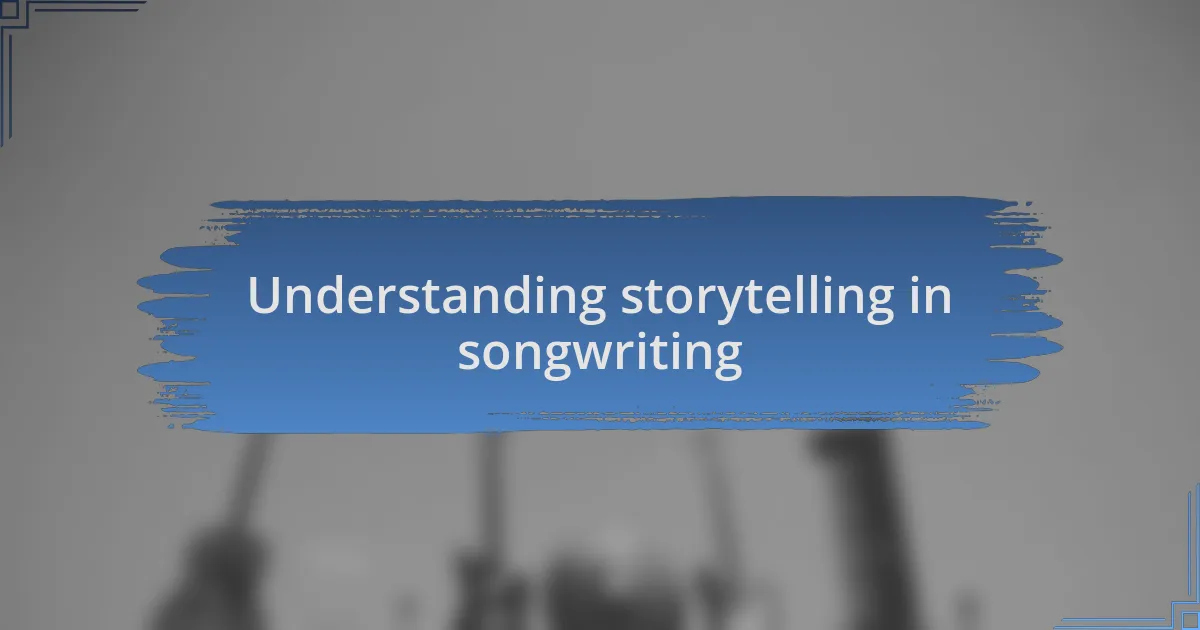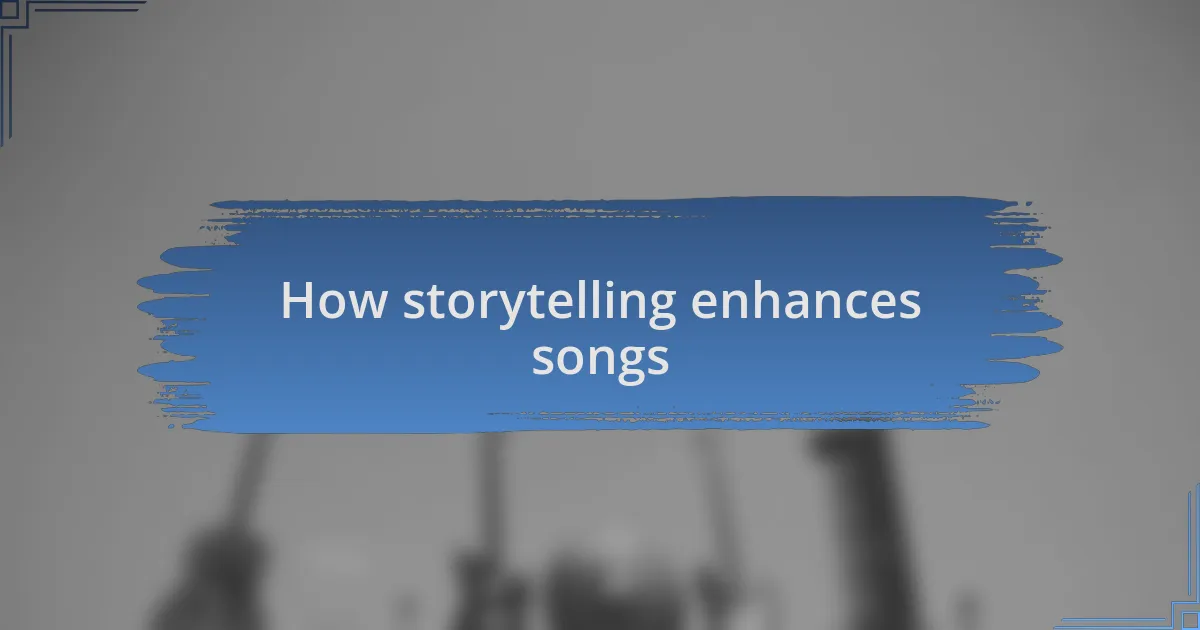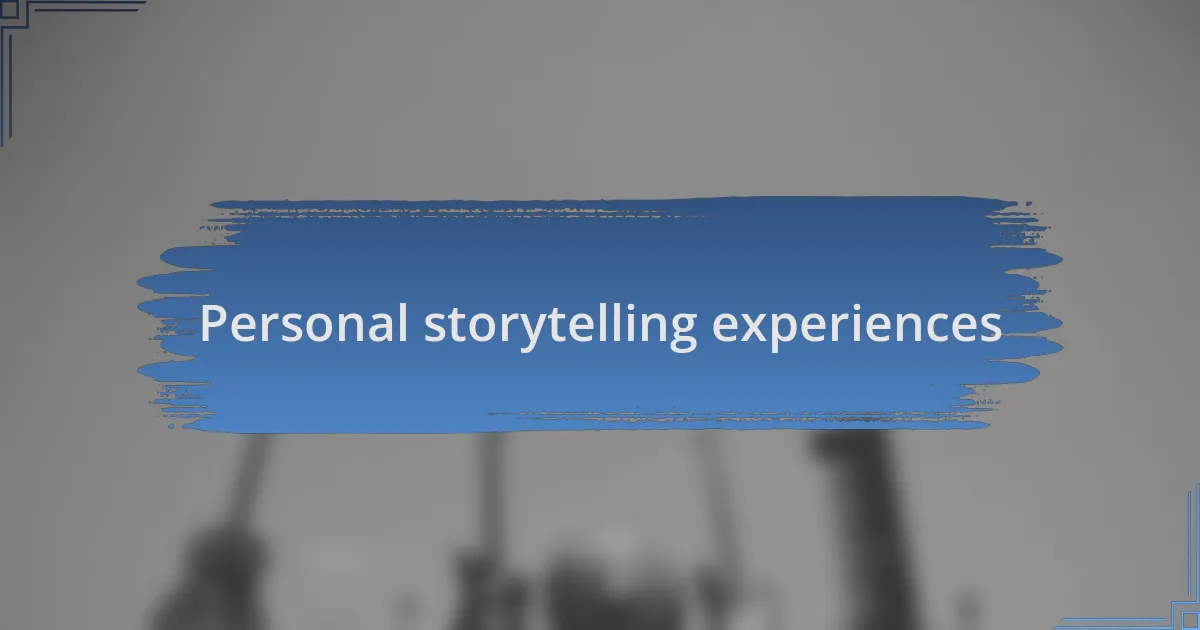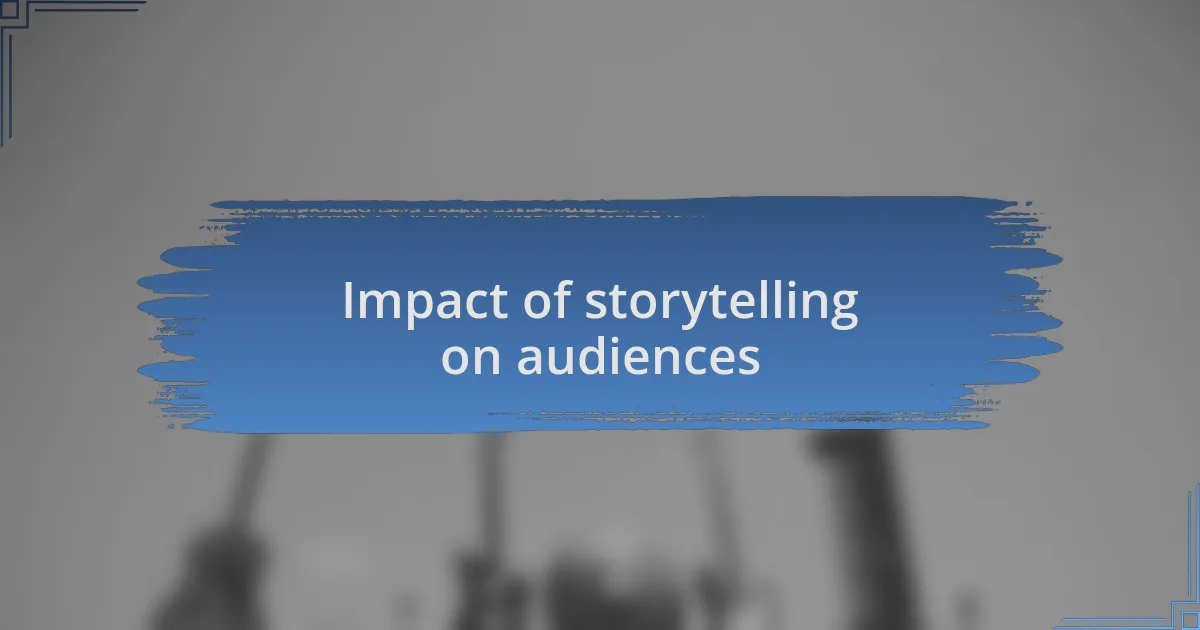Key takeaways:
- Storytelling is essential in songwriting, creating connections and evoking shared emotions through personal narratives.
- Songwriting awards validate artists’ efforts, enhance career opportunities, and spotlight diverse voices in the music industry.
- Effective storytelling techniques include using sensory details, character perspectives, and non-linear narratives to engage listeners.
- Personal experiences in songwriting can resonate deeply with audiences, fostering vulnerability and shared memories during performances.

Understanding storytelling in songwriting
Storytelling in songwriting is a powerful tool that transforms mere words into vivid experiences. I often think about how some of my favorite songs have transported me to specific moments in time, like my first heartbreak. This connection makes me wonder: how can I evoke those same feelings in my listeners?
When I write, I draw inspiration from my own life. For instance, a song I crafted about a long road trip captures not just the scenery, but the emotions of freedom and longing. The challenge lies in weaving together details that resonate universally while still feeling deeply personal. How do I find that balance? It’s all about the little moments—like a fleeting glance or the sound of laughter—that paint a larger picture.
I’ve also found that incorporating conflicts and resolutions can make a story relatable. In one of my tracks, I explored the tension of chasing dreams while facing self-doubt. It’s a struggle many can relate to. By sharing that journey, I invite listeners to reflect on their own battles, creating a shared experience that lingers long after the song ends. Isn’t that what storytelling is all about?

Importance of songwriting awards
Songwriting awards play a crucial role in recognizing the hard work and creativity behind each song. I remember the first time I submitted a song to a competition—it was nerve-wracking yet exhilarating. Winning that award not only boosted my confidence but also opened doors to collaboration with other artists who shared my passion. This recognition can bring a sense of validation that many songwriters crave, affirming that our stories indeed resonate with others.
These awards also shine a spotlight on the diversity of voices in the music industry. When I see nominations that celebrate varied genres and backgrounds, I feel a sense of pride. It reminds me that every story has value, and it’s inspiring to witness how different experiences weave into the fabric of our musical landscape. Isn’t it incredible how awards can help elevate unique perspectives that might otherwise go unnoticed?
Furthermore, songwriting awards can enhance a songwriter’s career trajectory, providing exposure that is often difficult to achieve. Through my own journey, I’ve realized that winning an award can lead to performance opportunities and even media attention. How can we ignore the potential for growth that comes from such accolades? They can truly act as a springboard, turning passionate songwriters into recognized artists with a genuine audience.

How storytelling enhances songs
Storytelling is the heart of a compelling song. When I craft a narrative within my lyrics, it creates a unique connection with listeners—as if I’m inviting them into a shared experience. I recall writing a song about a summer love that felt ephemeral yet unforgettable; its narrative transported listeners back to their own moments of joy and longing. Isn’t that the magic of storytelling? It evokes emotions that resonate deeply with our shared human experiences.
One of my favorite aspects of storytelling in music is its ability to convey complex emotions succinctly. For instance, I wrote a ballad that encapsulated the turmoil of loss through a character’s journey. By following that character’s emotional arc, I found that the audience could empathize more profoundly, as they could see their personal stories reflected in the lyrics. When a song tells a story, it becomes more than just a melody and words; it transforms into a vessel carrying shared memories and emotions.
Incorporating elements of storytelling can also add layers to a song, making it more engaging. I’ve found that when I introduce vivid imagery and relatable characters into my lyrics, listeners are more likely to remember and connect with my music. One time, I used a narrative about crossing a bridge to symbolize overcoming obstacles. That metaphor resonated with many people, sparking conversations and shared experiences. How powerful is it to know that a simple narrative can create such an impact?

Techniques for effective storytelling
One technique I find effective is weaving in sensory details. When I wrote a song about the bittersweet memories of childhood, I painted vivid scenes of laughter and the smell of fresh-cut grass. This approach helps listeners not just hear the song but feel it, as if they are experiencing those moments alongside me. Isn’t it fascinating how a simple scent can trigger such profound memories?
Another powerful method involves using a clear character perspective. In one of my tracks, I chose to narrate from the viewpoint of an elderly person reflecting on their life. By giving voice to this character’s regrets and joys, I was able to create a deeper emotional connection with the audience. I’ve learned that when listeners can see through someone else’s eyes, it often leads to a greater understanding of their experiences and emotions.
I also tend to play with structure to enhance the storytelling. In one of my songs, I opted for a non-linear narrative, jumping between past and present to illustrate the complexities of a relationship. This technique keeps listeners on their toes and encourages them to engage more actively with the lyrics. Don’t you think that adding layers of complexity can turn a good song into a great one?

Personal storytelling experiences
One personal experience that stands out is when I wrote a song about my grandmother. I shared how her stories of resilience shaped my understanding of the world. By incorporating her unique phrases and even her laughter, I felt like I was sharing a piece of her essence with the listeners. Have you ever tried capturing someone’s spirit in your own words? It’s a powerful connection.
Another memorable storytelling moment happened while penning a song about my first heartbreak. I chose to focus on the details of that rainy afternoon when everything felt bittersweet and heavy. As I replayed the emotions and imagery, I realized how those moments, while painful, became the canvas for my creativity. Doesn’t it amaze you how vulnerability can lead to artistic growth?
I also recall a time when I wrote about a community event that brought everyone together. The joy and warmth people felt that day inspired me to capture those fleeting moments in my lyrics. I wanted to portray not just the celebration but the togetherness that we often take for granted. Have you ever tried to weave collective joy into your own stories? It’s a reminder that our shared experiences can resonate on a much broader scale.

Impact of storytelling on audiences
When I perform my songs that dive into personal stories, I can often see the audience’s emotional reactions. For instance, after singing a tale about overcoming self-doubt, some listeners approached me, sharing their own struggles. It’s humbling to realize how storytelling can create a safe space for vulnerability and connection.
I once wrote a song that drew from a family vacation gone awry, filled with mishaps and laughter. While the memories made it feel like chaos, I became aware that audiences resonate with humor and relatability in storytelling. They don’t just hear notes; they relate, laugh, and remember their own chaotic family moments. Isn’t it fascinating how a simple story can spark shared memories?
Sharing a poignant moment about saying goodbye to a friend often elicits tears and nods from my listeners. This reinforces the idea that storytelling isn’t just about the narrative; it’s about the shared human experience. Have you noticed how songs can unify us, even in sadness? It’s almost like we’re embracing each other through these tales, transforming individual pain into collective healing.